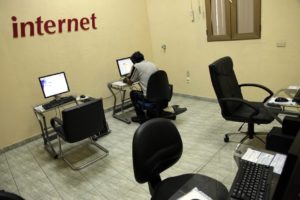Although the Cuban government maintains tight control over internet access in Cuba, there is at least one place free of censorship: Google content stored on servers on the island.
Google Global Cache uses local servers to store content from Gmail and YouTube, among others. The service, which began operating in Cuba in late April, is the result of a partnership with the state-owned telecommunications monopoly, ETECSA.
But the agreement signed in Havana in December contains a clause in which ETECSA commits to “not censor, surveil or interfere with the content stored as cache on those servers,” said a source familiar with Google’s efforts in Cuba.
This content is encrypted, which would make it even more difficult for the Cuban government to hack it.
Since former President Barack Obama announced the reestablishment of relations with Cuba in late 2014, Google has tried to carry out several projects on the island. The most ambitious was a proposal to massively extend internet access but the government rejected it in 2015. The company had to adjust its expectations and settle for the opening of an internet café at the studio of a controversial Cuban artist known simply as Kcho.
Google executives then offered to store its content on Cuban territory to facilitate the speed and quality of the connection to the popular internet services, but that was no easy task. Brett Perlmutter, the head of Google Cuba team, had to travel to Havana several times in 2016 to negotiate and persuade a reluctant Cuban government to accept the freedom of information clause, said the source.
Even though tools such as Google Chrome, Google Play, Google Analytics and Google Toolbar are already available on the island, Google blocks other services such as Gmail for businesses and Project Shield, which is used to protect news and human rights sites from cyber attacks.
The issue recently sparked controversy when Cuban activist Rosa María Payá discovered that the website of Cuba Decide — a citizens initiative seeking a plebiscite on the island — was blocked in Cuba and apparently not by the government but because the site was using Project Shield.
“I know that the government blocks a lot of sites, but that time it prompted a Google error page,” said Payá. A Wall Street Journal columnist then accused the company of collaborating with the Cuban government and of being “wholly uninterested in the Cuban struggle for free speech.”
(OPINIÓN) LIBERTAD DE EXPRESIÓN EN CUBA: SOLO EN EL SISTEMA GOOGLE.
Aunque el gobierno cubano mantiene un control estricto sobre el acceso a Internet en Cuba, hay por lo menos un lugar libre de censura: el contenido de Google almacenado en los servidores de la isla.
Google Global Cache utiliza servidores locales para almacenar contenido de Gmail y YouTube, entre otros. El servicio, que comenzó a operar en Cuba a finales de abril, es el resultado de una alianza con el monopolio estatal de telecomunicaciones ETECSA.
Pero el acuerdo firmado en La Habana en diciembre contiene una cláusula en la que ETECSA se compromete a “no censurar, vigilar o interferir con el contenido almacenado como caché en esos servidores”, dijo una fuente familiarizada con los esfuerzos de Google en Cuba.
Este contenido está encriptado, lo que haría aún más difícil para el gobierno cubano hackearlo.
Desde que el ex presidente Barack Obama anunció el restablecimiento de las relaciones con Cuba a finales de 2014, Google ha intentado llevar a cabo varios proyectos en la isla. La más ambiciosa fue una propuesta para extender masivamente el acceso a Internet, pero el gobierno lo rechazó en 2015. La empresa tuvo que ajustar sus expectativas y aceptar la apertura de un cibercafé en el estudio de un controvertido artista cubano conocido simplemente como Kcho.
Los ejecutivos de Google se ofrecieron a almacenar su contenido en el territorio cubano para facilitar la velocidad y calidad de la conexión a los servicios de Internet más populares, pero eso no fue una tarea fácil. Brett Perlmutter, jefe del equipo de Google Cuba, tuvo que viajar varias veces a La Habana en 2016 para negociar y persuadir a un gobierno cubano a aceptar la cláusula de libertad de información, dijo la fuente.
Aunque Google Chrome, Google Play, Google Analytics y Google Toolbar ya están disponibles en la isla, Google bloquea otros servicios como Gmail para empresas y Project Shield, que se utiliza para proteger las noticias y los sitios de derechos humanos de ataques cibernéticos.
La cuestión suscitó recientemente polémica cuando la activista cubana Rosa María Payá descubrió que el sitio web de Cuba Decide -una iniciativa ciudadana en busca de un plebiscito en la isla- fue bloqueado en Cuba y aparentemente no por el gobierno, sino porque el sitio usaba el Proyecto Escudo.
“Sé que el gobierno bloquea muchos sitios, pero esa vez provocó una página de error de Google”, dijo Payá. Un columnista del Wall Street Journal acusó a la compañía de colaborar con el gobierno cubano y de estar “totalmente desinteresado en la lucha cubana por la libertad de expresión”.
Agencies/NuevoHerald/Nora Gámez/Internet Photos/ Arnoldo Varona/ TheCubanHistory.coom
THE CUBAN HISTORY, HOLLYWOOD.








